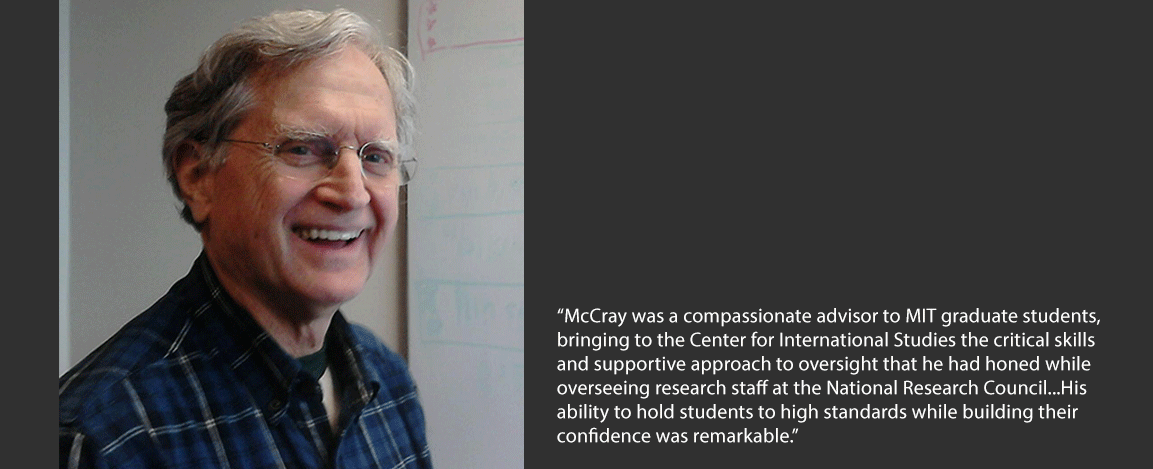Lawrence McCray, a former research affiliate at the Center for International Studies, passed away on December 26, 2023. An expert in science policy, McCray was a founder of the Program on Emerging Technologies and mentored many MIT graduate students during his time at CIS. Below are rembrances from some of his colleagues.
Throughout his life, Lawrence McCray took paths less traveled. After studying engineering and English literature as an undergraduate, McCray chose to pursue a doctorate in political science at MIT, which he completed in 1974. After being awarded the APSA EE Schattschneider Prize for the best dissertation in American government and politics, McCray chose to pursue a career of public service. After establishing himself at the White House and EPA and following retirement from his distinguished career at the National Academy of Sciences, McCray and his wife Alexa T McCray chose to move back to Boston, where they had spent their early married years. After becoming a ranked medieval court tennis player and leading SABR’s work on the origins of baseball, McCray spent countless hours advising political science and engineering students on their research papers and doctoral dissertations.
To appreciate McCray requires understanding these unusual choices. His extraordinary generosity, curiosity, and commitment to improving public policy were fundamental aspects of his character.
Most political scientists receiving APSA national dissertation awards become academics. McCray was not content with merely explaining dysfunctionality in public policy. He went to Washington to improve public policy, as director of regulatory reform at EPA, as director of the US Regulatory Council at OMB, and as founding director of the policy division of the National Research Council of the National Academy of Sciences.
At the National Research Council, McCray oversaw the production of many committee and panel reports. Risk Assessment in the Federal Government (1983) was a personal favorite. Known as the Red Book, the study became the go-to work on how government agencies should evaluate risks associated with chemical exposures, water and air pollution and other hazards.
McCray was directly engaged with writing Policy Implications of Greenhouse Warming: Mitigation, Adaptation and the Science Base (1991). Thirty years after publication, the report’s analysis of benefits and risks of policies ranging from reductions in CO2 emissions to geo-engineering through solar radiative management remain spot on.
His staff at the Policy Division produced many other studies, some accepted and some ignored. With great sadness, McCray noted that the recommendations of a study on the Challenger disaster that could have prevented the Columbia disaster were ignored. Disappointments notwithstanding, McCray lived his dream with his critically important work on improving public policies.
McCray’s generosity, humility and intense curiosity were hallmarks of his return to MIT. He came back to Boston when his wife Alexa left NIH for a faculty position in Biomedical Informatics at the Harvard Medical School. McCray’s devotion to family was manifest.
McCray was also a compassionate advisor to MIT graduate students, bringing to the Center for International Studies the critical skills and supportive approach to oversight that he had honed while overseeing research staff at the National Research Council. McCray advised generations of students in Science, Technology and Public Policy as they wrote papers on forecasting and on planned adaptation, and McCray worked with many political science doctoral students on their dissertations. His ability to hold students to high standards while building their confidence was remarkable.
McCray applied extremely high standards to his own work, with unstinting criticisms of the quality of his own arguments and evidence on planned adaptation. McCray brought to his work the curiosity and tastes of a good historian. He recognized messiness and complexity in the world, he was suspicious of studies where arguments and evidence meshed perfectly, and he recognized path dependency and inertia as powerful forces in human affairs. These elements may have played some role in his peculiar choice of avocations. His devotion to mastering medieval court tennis and to probing the evolution of the rules of precursors to modern baseball are in keeping with his intellectual tastes.
McCray’s ability to work across disciplinary lines was much in evidence as a founder of the NSF supported Program on Emerging Technologies. He was the critical link joining historian Merritt Roe Smith, aeronautical engineers Dava Newman and Daniel Hastings, biological engineer Drew Endy, CSAIL senior scientist David Clark, and political scientist Kenneth Oye. All of us will miss his wry humor, his brilliance and his friendship.



